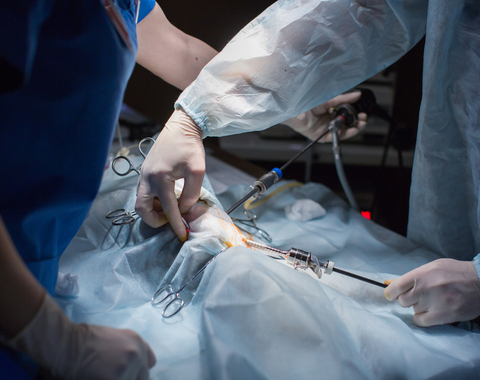How to Prepare Your Dog for Surgery
Preparing your dog for surgery is stressful. Whether it’s a dental cleaning or something more complex, like a hip replacement, planning ahead and preparing your pet for surgery is important.
When preparing your pet for surgery there is a lot of information to consider. Is your dog allowed to eat? Are there any medications he needs to take? Is there additional testing that needs to be done before the surgery? Your veterinarian will provide you with instructions to follow to prepare your pet as well.
You should start preparing your dog for surgery at least one week before the scheduled dog if possible.
ONE WEEK BEFORE THE SURGERY
Ensure that your dog is up-to-date with all of their vaccinations. Check with your veterinarian to know which ones are required for surgery. It’s important that any vaccinations your pet does not have are administered at least five days before surgery to ensure that your pet is properly protected. It is important that you have the necessary time off of work or school in order to take your pet in for the surgery and be available to care for them afterwards.
THE NIGHT BEFORE SURGERY
Get with your vet to ask questions that you may be wondering and whether or not you should give your dog any medication they normally take. In some cases, it may be important for your dog to continue taking their medication leading up to surgery and in others it will be necessary for them to have an empty stomach during surgery.
Additionally, you may want to give your dog a bath the night before surgery as you may not be able to groom your dog for several days after surgery. If your dog doesn’t require a bath, you may consider giving them a good brushing beforehand.
The day before surgery, don’t go on long walks or allow your dog to play roughly. This may cause their muscles to be extra sore the day of surgery, and they don’t need more soreness on top of the discomfort from the surgery.
Also consider washing your dog’s bedding. This ensures that their sleeping space is as clean as possible to reduce risk of infection, and they can be as comfortable for recovery as possible.
If your dog needs to be limited in their movement during recovery, prepare an enclosed area of your home now with their crate. This ensures that once you are home from surgery, you don’t need to run around, setting up an area for your pet.
It’s important for most surgeries that your pet fast beforehand. This is because if your dog becomes nauseous from the anesthesia, they may vomit during surgery, which comes with the risk of your dog choking. Take away food and water from your pet the night before surgery, and make sure there is no way for them to eat or drink after midnight before the surgery. If your dog somehow does eat before surgery, let your vet know that they did so they can watch out for vomiting.
Finally, ensure that everyone is well-rested before surgery. If both you and your pooch get enough sleep, it will make surgery much less stressful for everyone.
THE MORNING OF YOUR DOG’S SURGERY
The morning of surgery do not give your dog anything to eat or drink if required by your vet. It si crucial to give yourself plenty of time to get to your veterinary clinic to ensure that surgery is as stress-free as possible. You will be contacted as soon as your the surgery is complete. When leaving your pet for surgery it is extremely important that you remain as calm as possible so that you do not add stress and confuse your pet further. You want your pet to be calm leading up to and during the procedure.
AFTER SURGERY
Once you bring your dog home post-surgery, make sure to follow the instructions given by the vet precisely. Even if you feel that your pet is fine and normal after surgery, do not allow them to play or move around too much so that any incisions rip and prevent any pain. Watch out for any chewing or licking of the stitches, as well as any changes in your dog’s disposition or appetite. If you notice anything unusual, feel free to call our veterinary hospital for guidance.
You may be anxious about your pet’s surgery, but if you are prepared for it, the recovery time will go a lot smoother.
